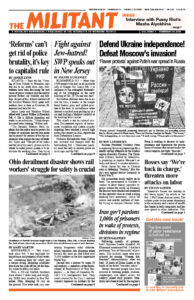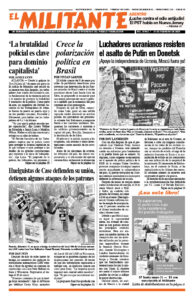Following months of protests, Iran’s Supreme Leader Ayatollah Ali Khamenei announced Feb. 5 that he is pardoning “tens of thousands” of prisoners. This includes many who were arrested for joining “Women, life, freedom” demonstrations after the Sept. 16 death of Zhina Amini at the hands of the hated “morality police.”
Twenty thousand people have been arrested as working people, students, shopkeepers and others across the country joined daily protests. Hundreds have been killed by the regime’s thugs. New arrests continue.
The issuing of pardons was timed to coincide with the anniversary of the 1979 revolution that overthrew the U.S.-backed dictatorship of the shah of Iran. Khamenei’s bourgeois-clerical regime lays false claim to be the continuity of that uprising. He said pardons would not be offered to those the regime claims “committed espionage,” had “direct contact with agents of foreign intelligence services,” committed violent acts, or were involved in drug dealing.
The daily Etemad (Trust), aligned with the reformist faction of the Iranian capitalist class, noted that many people are falsely accused of “acting against national security.” No one should be excluded from amnesty “for fictitious reasons,” the paper said. Khamenei presented the amnesty as a sign of the regime’s benevolence toward “misguided young people” incited by “foreign enemies” — meaning the U.S., Saudi and Israeli governments.
Tasnim News, a voice of the regime, published an interview with former Tehran City Council President Mohsen Hashemi Rafsanjani that gets at the reasons behind the amnesty. Alluding to the protests, Rafsanjani said the pardons are an opportunity to “extinguish the fire under ashes. This can create relative peace and neutralize the anti-revolutionary provocations.” Rafsanjani is from the reformist faction and his sister is a political prisoner.
A sea change in consciousness
While the protests have tapered off, there has been a sea change in the attitude of working people and others toward Iran’s rulers. Every week there are new actions by workers demanding improved wages and conditions, farmers demanding water rights, retirees demanding increased pensions and more.
The regime can’t even stop opposition inside prison walls, despite torture and beatings. During a family visiting day in mid-January at Tehran’s Fashafouye prison, people whistled, clapped and cheered every time a prisoner was brought to the visiting room. At one point a voice could be heard across the room, “Women, life, freedom!”
Demands to free all political prisoners, abolish the death penalty, and to guarantee freedom of speech and equal rights have been at the heart of weekly protests in Baluchistan, home of the oppressed Baluch nationality and one of the most underdeveloped regions of the country.
On Feb. 3 thousands demonstrated in Sistan-Baluchistan province, including in Khash and the capital, Zahedan, and in Golestan province, home to Turkmen and many Baluch. Hundreds also marched in Sanandaj, Kurdistan province.
“Down with the oppressor whether he is the shah or the Supreme Leader,” was a prominent chant in Zahedan. The predominantly Sunni Baluch, Turkmen and Kurdish nationalities in Iran have a long history of standing up to the oppressive Shiite-based regime and to the monarchs who came before it.
Sunni clerics denounce repression
Protesters demanded the release of Maulana Abdulmajid Moradzehi — a close adviser of Sunni cleric Maulana Abdul-Hamid, a prominent critic of the regime — along with others who have denounced the repression, including Sunni cleric Maulana Gargij, who is under house arrest in Golestan, and recently imprisoned clerics and teachers in the Kurdish region.
Moradzehi was arrested on charges of talking to the foreign press. When Iranian media “exclusively serve the government and do not reflect the voice of the people, we have no choice but to give interviews to the foreign media,” the Teachers Association union at the Darul Uloom School in Zahedan said.
Kayan newspaper editor-in-chief Hossein Shariatmadari, an ally of Khamenei, has criticized Abdul-Hamid for backing the protests and for calling for respecting the rights of the Baha’i religious minority — who are treated as “infidels” by the government — and for supporting recognition of both Israel and a Palestinian state.
Baluchistan-based Sunni Online came to Abdul-Hamid’s defense. It’s not a question of what you think of other people’s religious beliefs, the site said, quoting the cleric’s statement, “If a Jew, a Christian, a Baha’i or a Dervish is wronged, we will be upset.”
Shariatmadari’s criticism of the cleric’s support for “two independent states of Palestine and Israel,” Sunni Online said, is a “dying ideology.”

